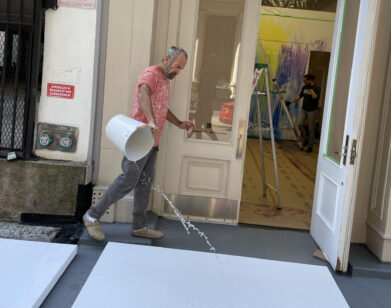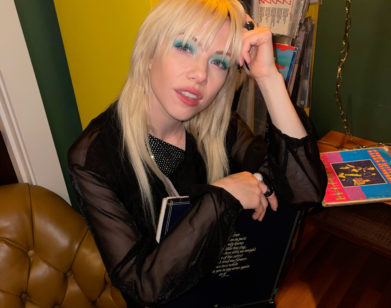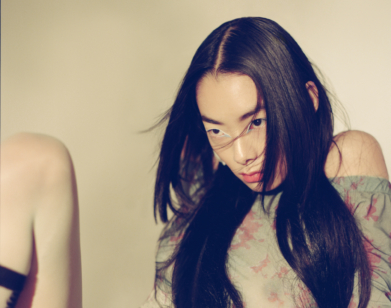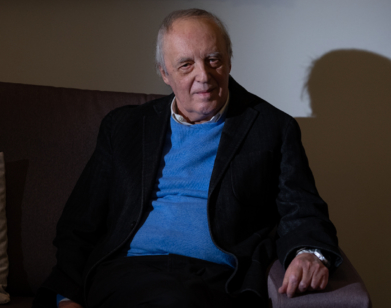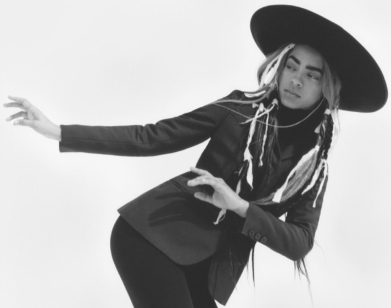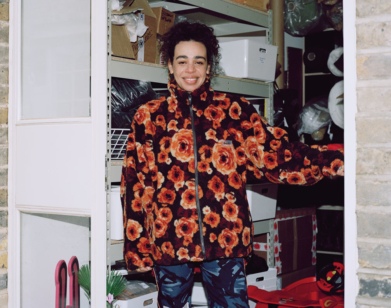Carly Rae Jepsen and Cyndi Lauper Talk Hair Dye and Heartbreak
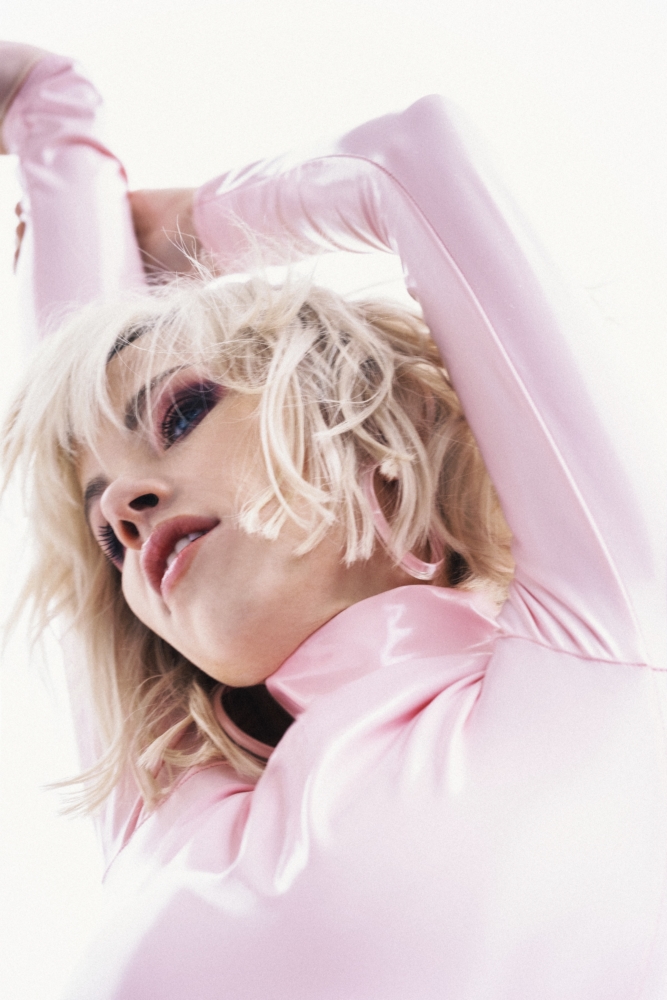
Photo by Markus&Koala.
Forget what you think you know about Carly Rae Jepsen. For many, she may still be the “Call Me Maybe” bubblegum-pop princess who rose to ubiquity in 2011. Her breakout single ruled the charts for eight weeks, but as most pop musicians know, a hit song does not always a successful artist make. (Remember The Knack? Neither do we.) To avoid the perils of one-hit wonderdom, reinvention is key. So Jepsen leaned into the fundamentals of pop music, assembling a group of indie-pop producers (Blood Orange’s Dev Hynes and former Vampire Weekend member Rostam Batmanglij), and baring her soul on her third album, 2015’s aptly titled Emotion. After gaining a cult following due to her ability to create infectious ’80s-synth pop about pain and boys (and the way those two intersect), the 33-year-old Canadian is now in full bloom, having transformed, yet again, with her new album Dedicated, out this week. What started as a set of “chill disco” tracks quickly evolved into a collection of transformative moments—slices of life Jepsen picked up as she traveled the world, fell in love, had her heart broken, and wrote it all down. Over the years, she has amassed a supportive, and loud, fan base—solidly composed of gay men on Twitter—as well as the Grammy-, Emmy-, and Tony Award-winning pop icon Cyndi Lauper. “I have so many questions,” Lauper told me over the phone, as we waited for Jepsen to join the call. “I love Emotion. The first one, ‘Run Away With Me,’ the lyrics—come on!” Some time after they shared the stage at Carnegie Hall in New York City, Lauper and Jepsen discussed everything from songwriting on napkins to performing at Pride festivals. To say the least, the girls just had fun. —ERNEST MACIAS
———
CYNDI LAUPER: Doll! How are you?
CARLY RAE JEPSEN: Oh my God.
LAUPER: Is that you?
JEPSEN: It is.
LAUPER: How you doing?
JEPSEN: This is such a thrill for me today. I’m doing really good. Where are you in the world right now, Cyndi?
LAUPER: I’m home, in New York like usual. I’m always home, unless I have to move my lard ass out of New York and go someplace upside down, like Japan or Australia or some other place. No place like home, just like Dorothy.
JEPSEN: There is no place like New York.
LAUPER: I was listening to your new CD. You start out with this guy and you’re really nutty for him. Right? Then, as you go on, it’s over. He’s a bit of a self-involved idiot. “Run Away with Me” is my favorite. “I’ll find your lips in the streetlights or I’ll be your sinner in secret.” Come on, that’s awesome what you wrote. I’ve listened to your work over the years, and I think your poetry just gets better and better.
JEPSEN: Oh my God, thank you.
LAUPER: I’m curious how you write. Everybody writes differently. Do you take long gigantic walks and then sing to yourself? Or do you go into the studio by yourself with a little beat machine and a keyboard and make a melody? Do you play an instrument? Or do you get a track and sing to it?
JEPSEN: I don’t know your process, but mine is kind of all of the above. I don’t have one set rule about how songs happen. Sometimes I’m collecting lyrics as I go and just putting them in my phone or scribbling them on pieces of paper. Sometimes I’m on the plane and an idea will start to take form. I’m embarrassingly singing it into a voice memo or trying to go to the bathroom to record it. It never totally works.
LAUPER: Do you lose all those napkins? I used to write on napkins, then I’d go crazy looking for the freaking napkins.
JEPSEN: I have scribbles of things in all different places. I find that if an idea is really important, I revisit it quite quickly afterwards and I start to workshop it immediately. I also love collaborating, and I love getting in the room with people who go at music differently than me. If they start with a drumbeat or something different, it changes the way that I want to write that day. How do you go at it?
LAUPER: I started as this singer with a big voice, and in my day, singers with big voices, they didn’t write. They sang other people’s music. It was always a fight. We used to have Walkmans—Sony Walkmans, which are kind of like the phones with the voice memos. Let me tell you a little secret that I had to learn: Never download the good microphone. Always use the shitty voice memo on the phone because that’s the one that’s Apple. Should anything happen to your phone, they can always retrieve that.
JEPSEN: This is amazing advice.
LAUPER: I’m sorry, I dropped the S bomb. Anyway.
JEPSEN: You’re allowed. Do you ever have dreams about songs? I don’t know if that’s an unusual thing, but it’s happened to me about three or four times where I’ve woken up and I’ve told my boyfriend or, if I’ve been single, myself, “What is that song that was in my dream?” I’ll sing it to a bunch of people and I’ll realize that nobody has heard it. It was just my subconscious that came up with this weird idea.
LAUPER: The way I do it—I come from a generation where you collaborate, you write songs together. I like to go in and find a drumbeat, play it, and even if it’s crap, so what? Dare to suck.
JEPSEN: Dare to suck. I should have that tattooed on my body.
LAUPER: You have to. You know what, hun, I think you’re doing really great. You’re reinventing. What I found, listening to your lyrics, is some of it is not so happy. When a relationship gets busted up, that’s not happy, but you seem to show a brighter side to it. I thought, listening to “Party for One” babe, “Wow, that’s clever, and that’s a slice of life.” A moment. When I heard the album, I thought, “That’s an arc.” It’s a story. It’s a whole journey.
JEPSEN: You’re making my day. People say that they write one album and then they write another one five minutes later. I like to take time with my music because it is hard to write until you’ve had some new life experiences. Have some shit to talk about. I think that is exactly it. My album is a bunch of moments that come from a couple of years of living and trying out this whole love thing.
LAUPER: You wrote this album all over the world. You went to Sweden. How was it for you?
JEPSEN: I had a beautiful Swedish experience. I had a baby romance going on at the time with a Swede. That’s where “Run Away with Me” was born. I just keep going back because of the friendships. I always end with an apartment or hotel full of people. We’re celebrating, saying goodbye. It’s always been one of my favorite spots to write.
LAUPER: I went to Sweden and stayed in an old hotel. I thought that Old Town was a lot like Greenwich Village, until I started to look around and notice that there are no artists there.
JEPSEN: That’s where I stay.
LAUPER: I thought some of the Swedish people were really great, but because I was so freaking famous everybody had preconceptions of me already before I even got there. I find everything very male-dominant all the time. Then here comes the little woman saying, “Oh, hi, I want to do this and this.” Keep in mind, Carly, this was 2007.
JEPSEN: I didn’t experience the exact same thing in Sweden, but in Los Angeles I’ve definitely had that feeling, especially with the making of the Kiss album. I’d walk into sessions and it would feel very much like people already had an idea of who I was and what songs they were going to make for me. I was like, “Wait a second.”
LAUPER: They’re trying to teach you, as opposed to collaborate. You went to Nicaragua. What the hell were you doing in Nicaragua?
JEPSEN: At least when I’m single, I end up doing braver things than I expect. I was just looking to distract myself. I said yes to an offer at a writers’ camp, which, in theory, I usually hate the idea of a writers’ camp.
LAUPER: Wait. A writers’ camp, in Nicaragua?
JEPSEN: We were staying in a spot called Maderas Village. It was a little bit of a jungle sanctuary. We had all these little casitas. Inside the casitas were built studios, writing rooms. We would be swimming and chilling during the morning, have some beautiful breakfast, and then we’d go to different assigned studios with new people, absolute strangers, and write songs all day.
LAUPER: Wow, that’s extraordinary.
JEPSEN: It was the best time.
LAUPER: You wrote some of this album there?
JEPSEN: I did. Similarly to other writing camps, at the very end of the last night, everyone goes to the main high casita, with a view of the ocean and everything, and we all get our little cocktails and we sit around and play our songs to each other. I came back with so many new friends from that experience, and I think three or four songs that are either going to be on this album or the one following.
LAUPER: That’s great. I thought your album was ready to go and done.
JEPSEN: It is, but I have dreams. Ever since I put out a B-side for Emotion, I have a dream of putting out a part two for this album, as well. When you write as many songs as I did, it’s kind of terrifying to only get to share 15. I want to share at least 30.
LAUPER: Wait, I’ve heard you wrote 200 songs for this album. Is that true?
JEPSEN: About 200. I think about 200 for Emotion before I narrowed it down, too. I’m definitely an over-writer, over-thinker, all of the above. How many songs do you write when you’re making an album? I know that my process is an unusual one.
LAUPER: Never like that. Never.
JEPSEN: I envy you. I wish I didn’t work like that.
LAUPER: No, I envy you. I never saw myself as a great writer. Because I was told, “Why don’t you just shut up and sing?”
JEPSEN: That’s a really good song title right there: “Shut Up and Sing.”
LAUPER: I was just thinking about that when I said it. I walk a lot and I sing to myself. When I first became famous at 30, I couldn’t walk down the street without an unfortunate mob scene. I started to stay inside a lot. All the things that I loved—my bracelets, the color, everything that made me feel happy and alive—I had to take off if I wanted a walk. 200 songs, that is a lot.
JEPSEN: It was over the span of three or four years, but it was definitely a passion project for me. It just ended up taking on a life of its own. As you know, you write in one direction and then you start to get excited, and you want to go play in that world for a bit.
LAUPER: The name of this album is Dedicated. Who is it dedicated to? Yourself? Or just dedicated to getting it done?
JEPSEN: You could look at it both ways. I wrote a song for my boyfriend called “Dedicated.” It was sort of exploring what it means to be dedicated. He was going through some stuff, and I just wanted to romantically write something just for him. Usually, I pick a song to be a title for the album, but this time I went with a secret song as the title for the album.
MACIAS: Now that your album is nearly out, Carly, you get to enjoy the finished product. What do you do to take time off after you complete an album, if you take time off?
JEPSEN: It’s kind of a trippy time because the days fill up with a lot of stuff. I do feel like it’s important—I’m learning this more and more—that even in the middle of tour cycles, you need to take time here and there. Even if it’s three days to drive up to Big Sur, or five days to just say, “I’m going on hiatus. Nobody talk to me. I’ll be watching some long series, eating all the foods I want, and sitting like a potato.” I need to do that sometimes.
LAUPER: When I was younger and I put out a record, you got on that hamster wheel and it was 12-hour days, 18-hour days. Then you shoot a video. Then you’re in the edit bay. Because you are dedicated, you go and do them. Once you’re inside that hamster wheel, that’s it.
JEPSEN: I remember, during my last cycle for Emotion, looking at the calendar and calling my manager and being like, “Okay, so, I realize that I don’t have a day off in the next four months. After that, can we start having one day a week that I don’t have to do anything?” It was just crazy.
LAUPER: I’m talking to you like we’re not doing an interview here.
JEPSEN: God knows I would love to collaborate with you, Cyndi. You’d be top of my list.
LAUPER: I would do that of course. I love to collaborate. What about the fans? I think it’s great, but nutty.
JEPSEN: It’s the best.
LAUPER: …and the sword!
JEPSEN: We just get a kick out of it. I have no idea. I think at some point I found myself surrounded with the most joyful and creative fan base. I just get a kick out of them everyday.
LAUPER: I think that for you, and because of the way you write, you have a lot of LGBT fans that look up to you and take comfort from your work. It makes them feel happy.
JEPSEN: I love the fact that we get to give back and support. My best friend from Vancouver who came out as gay to his family was the first person to put it in my head. I think growing up in Canada, I didn’t really understand the world’s view on this and how fucked it was—for some people, not everyone. Once I started to see that it was a real issue, it’s been important to me to be a part of any campaign to help support and show love.
LAUPER: Because of my sister and my dear friends, I’ve always been kind of part of the community. I think it’s important to stand up for your friends and to not allow hatred and ignorance to win, because it is hatred and ignorance. I’m a lot older, so I lived through the civil rights movement and I lived through the women’s movement, which are still going on. We somehow can’t get a grip on this thing. With the civil rights movement, everyone had to show up, not just the people who were affected, but other people too.
JEPSEN: It gives me happiness, too. I think, I don’t know about you, but of all the festivals and shows that I’ve played, the most joyful and full of life, love, and celebratory energy is always a Pride festival.
LAUPER: It’s the shit. Do you know why? We all get to celebrate our differences together. That’s what it always was. Listen, you know what I think about hair. Hair grows back and hair color was made for us to experiment with.
JEPSEN: I think girls just want to have fun! That’s exactly it. I was very scared for the first half of my life with any kind of changes. I always had bangs—my “security bangs,” I called them, and long brown hair. As soon as I started to play with it, it was like a tattoo addiction, I guess. I couldn’t stop. I don’t think I ever will.
LAUPER: Listen, I started at age 12 with Sun In, and then it just progressed. I must admit, it was a lot more colors than just blonde, but it was a lot of fun. I’m still doing it—I’ve got a purple- pink thing going on right now.
JEPSEN: I loved the purple that I saw in New York! You just looked gorgeous. It was so lovely. Thank you again for inviting me to that. It was a really special night.
LAUPER: No, thanks. That was good for the kids, too. We did something good.

